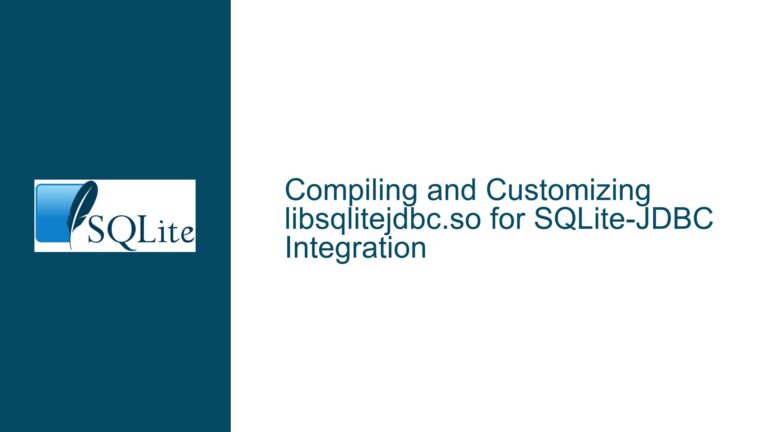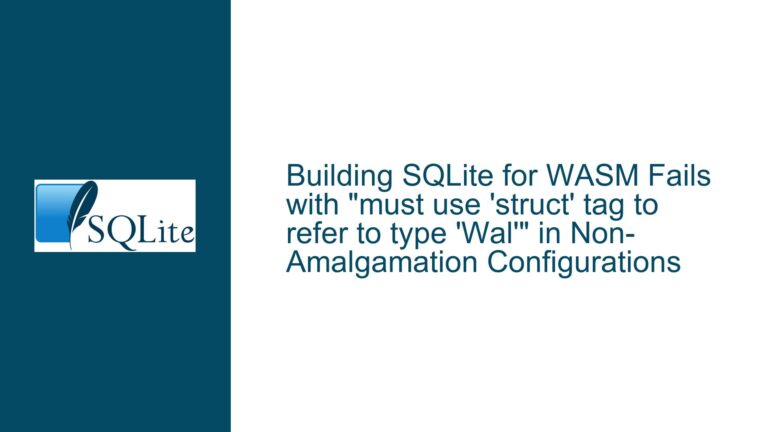Resolving Anyquery CLI Integration Challenges with SQLite and MySQL-Compatible Servers
Understanding Anyquery’s SQLite Engine Integration and Plugin Architecture
The core challenge when integrating Anyquery CLI with SQLite revolves around reconciling its hybrid architecture. Anyquery leverages SQLite as its underlying query engine but extends its capabilities through Go-based plugins and RPC-based communication. A common pain point is ensuring that data from heterogeneous sources (files, APIs, logs) is correctly normalized into SQLite-compatible schemas. For instance, when querying a JSON API via a custom plugin, Anyquery must map nested JSON structures to flat SQLite tables. Misalignment in data type handling—such as date formats, null representations, or array flattening—can lead to silent data truncation or query errors. Additionally, SQLite’s strict typing system may conflict with dynamic data sources where schemas are inferred at runtime. Developers often overlook SQLite’s STRICT table mode, which enforces column-level type constraints, causing INSERT failures when plugins pass loosely typed data. Another layer of complexity arises from Anyquery’s use of virtual tables or SQLite extensions (e.g., JSON1, FTS5) to interface with external data. If plugins fail to initialize these extensions properly, queries targeting specialized functions will return "no such module" errors. Debugging requires inspecting the SQLite build embedded within Anyquery to confirm extension availability and linkage.
Diagnosing MySQL-Compatible Server Configuration and Protocol Mismatches
When operating Anyquery as a MySQL-compatible server, protocol mismatches between MySQL clients and the SQLite backend are a frequent source of failure. Anyquery emulates the MySQL wire protocol but translates queries into SQLite syntax, which lacks support for certain MySQL-specific clauses (e.g., LOCK IN SHARE MODE, ENGINE=InnoDB). Clients expecting MySQL-style transactional guarantees may encounter unexpected behavior due to SQLite’s different locking model. Authentication issues also emerge because Anyquery’s server component may not fully implement MySQL’s password hashing mechanisms (e.g., caching_sha2_password). Clients using older MySQL connectors might fail to negotiate TLS or authenticate if Anyquery’s server defaults to unsupported SSL modes. Port conflicts are another common culprit, especially when Anyquery’s server runs on the default MySQL port (3306) while another MySQL instance is active. Network configuration oversights, such as binding to localhost instead of 0.0.0.0, can prevent remote clients from connecting. To isolate these issues, developers must examine connection strings, packet captures (using tools like Wireshark), and Anyquery’s server logs for protocol handshake failures or unsupported client capabilities.
Mitigating Plugin Development and RPC Communication Failures
Custom plugin development for Anyquery introduces challenges in Go-based RPC communication and lifecycle management. Plugins are compiled as standalone binaries invoked via RPC, requiring precise adherence to Anyquery’s input/output contracts. A typical failure occurs when plugins omit required fields in the JSON payloads exchanged with the Anyquery core. For example, a plugin designed to parse log files must emit a JSON array with timestamp, severity, and message fields; missing fields will cause SQL queries to return incomplete results. Deadlocks or stalled queries may arise if plugins do not handle SIGTERM signals correctly, leaving zombie processes. Memory leaks in plugins—common when Go routines are not properly synchronized or channels are left unclosed—can degrade Anyquery’s performance over time. Developers must also ensure that plugins sanitize inputs to prevent SQL injection when Anyquery dynamically generates queries from external data. Another pitfall involves plugin registration: Anyquery’s configuration files (e.g., plugins.yaml) must specify exact paths to plugin binaries and valid parameter templates. Incorrect file permissions or PATH environment mismatches will prevent plugins from launching. To troubleshoot, enable Anyquery’s debug mode to log RPC payloads and validate plugin outputs against SQLite’s schema expectations using intermediate JSON validators.
Issue Deep Dives and Solutions
1. SQLite Schema and Data Type Misalignment
When plugins ingest data from REST APIs or log files, implicit schema inference can clash with SQLite’s type system. For example, a field appearing as an integer in one API response and a string in another will trigger SQLITE_MISMATCH errors if the target column is defined with STRICT typing. To resolve this:
- Explicitly define schemas in plugin configuration using
CREATE TABLEDDL statements withSTRICTmode. - Use SQLite’s
JSONextension to store raw JSON responses in aTEXTcolumn, then extract fields dynamically usingjson_extract(). - Implement data type coercion in plugins by casting values to SQLite’s storage classes (NULL, INTEGER, REAL, TEXT, BLOB).
2. MySQL Protocol Translation Gaps
Queries containing MySQL-specific syntax (e.g., /*!50100 ... */ conditional comments) will fail because Anyquery’s translator does not strip or adapt these directives. Mitigation strategies:
- Use Anyquery’s preprocessor directives to rewrite queries client-side.
- Enable
--mysql-translate-logto identify unsupported clauses and manually refactor them into SQLite-compatible equivalents (e.g., replacingAUTO_INCREMENTwithAUTOINCREMENT). - Configure connection pooling to handle MySQL client expectations about session state variables like
@@tx_isolation.
3. Plugin RPC Timeouts and Resource Leaks
Long-running plugin processes (e.g., streaming data from WebSockets) may exceed Anyquery’s default RPC timeout (5 seconds), causing premature termination. Solutions:
- Adjust the
plugin_timeoutsetting in Anyquery’s global configuration. - Implement incremental output in plugins by flushing JSON records periodically instead of buffering entire results.
- Use Go’s
pprofto profile plugin memory usage and identify leaks in goroutines or unclosed file descriptors.
4. Authentication and TLS Configuration for MySQL Clients
To resolve client authentication failures:
- Verify that Anyquery’s server uses a password hashing method compatible with the MySQL client (switch to
mysql_native_passwordif necessary). - Generate TLS certificates with
openssland specify paths in Anyquery’sserver.tlsconfiguration block. - Use
mysql --ssl-mode=DISABLEDfor testing to bypass encryption mismatches during development.
5. Virtual Table Initialization and Extension Loading
If SQLite extensions fail to load:
- Confirm that the Anyquery binary includes the extension (e.g., compile SQLite with
-DSQLITE_ENABLE_JSON1). - Load extensions explicitly at runtime using
SELECT load_extension('json.so');in initialization scripts. - Use absolute paths for extension libraries to avoid linker errors.
6. Debugging Plugin-Schema Mismatches
Enable verbose logging in Anyquery (--log-level=debug) to capture the exact schema inferred from plugin outputs. Compare this with the SQLite table definitions using sqlite3_analyzer or .schema commands. If discrepancies exist, override the inferred schema in the plugin’s configuration with explicit column types.
7. Handling Concurrent Writes in SQLite via Anyquery’s MySQL Server
SQLite’s write-ahead logging (WAL) mode allows concurrent reads but serialized writes. When multiple MySQL clients connect via Anyquery, configure:
PRAGMA journal_mode=WAL;
PRAGMA busy_timeout=30000;
to reduce contention. Monitor for SQLITE_BUSY errors and implement client-side retries.
8. Custom Plugin Input Validation
To prevent malformed data from reaching SQLite, embed validation logic in plugins using Go’s validator package. For example:
type LogEntry struct {
Timestamp time.Time `json:"timestamp" validate:"required"`
Message string `json:"message" validate:"min=1"`
}
Reject invalid entries before they’re passed to Anyquery’s RPC layer.
9. Network Troubleshooting for Remote MySQL Clients
If clients cannot connect to Anyquery’s MySQL server:
- Confirm the server is bound to the correct interface using
netstat -tulpn | grep 3306. - Test connectivity with
telnet <host> 3306to rule out firewall issues. - Capture MySQL protocol traffic with
tcpdump -i any port 3306 -w anyquery.pcapand analyze packet sequences for incomplete handshakes.
10. Optimizing Query Performance with SQLite Explain
For slow queries originating from Anyquery, use EXPLAIN QUERY PLAN to identify full-table scans or missing indexes. Create covering indexes in SQLite based on frequent WHERE or JOIN clauses. Leverage Anyquery’s caching layer (if enabled) to memoize results from expensive plugin operations.
Final Validation Steps
After applying fixes:
- Run integration tests with
anyquery-cli test --data-source=plugin:my_plugin --query="SELECT COUNT(*) FROM data". - Validate MySQL compatibility using
mysqlslap --concurrency=10 --iterations=100 --query="SELECT * FROM my_table". - Profile plugin execution with
go tool pprof -http=:8080 anyquery-plugin-*.prof.
This systematic approach isolates integration points between Anyquery’s components, SQLite’s constraints, and MySQL client expectations, ensuring robust deployments across diverse data sources.






